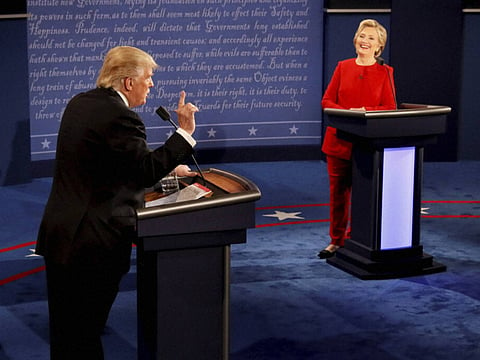A decisive debate ... or maybe not
One disastrous debate can sink a presidential campaign, but there is no certainty that it will

Will Republican presidential nominee Donald Trump’s claim, that if he didn’t pay taxes that was “smart”, come back to haunt him? Did Democratic nominee Hillary Clinton come across as too much the traditional politician? Will Trump’s rambling defence of how he finances real estate deals and often refuses to pay small businesses to whom he owes money hurt him? Did Hillary manage to stop the momentum Trump has developed over the last few weeks?
By the time you read this, we should have an early sense of how American voters reacted to what was surely the most hyped debate in the political history of the United States. The key word in that sentence, however, was “early”. Though 100 million Americans may have watched the debate, many more will experience it mainly after-the-fact in the form of commentary, analysis, political spin and video clips shared online.
Political conventional wisdom takes time to coalesce, and scientifically legitimate polls are conducted over a period of several days. It will probably be Saturday or Sunday before we have a real sense of whether the Monday night (US time) debate altered the campaign landscape and, if so, how.
The modern tradition in the US is for the main presidential candidates to debate three times in the period between mid-September and mid-October with the final debate taking place around three weeks prior to Election Day. Historically speaking, the first debate almost always draws the largest audience and if there was one thing pundits agreed on heading into this debate it was that the audience would be huge.
“It will be the most watched event in human history. Bigger than the moon landing, World Cup, Super Bowl, the Olympics and the latest royal wedding,” longtime Democratic campaign strategist and occasional CNN host Paul Begala told the New Yorker magazine last week.
In 2000, Begala was a top campaign aide to then-vice president Al Gore and played George W. Bush during the Gore team’s debate-prep sessions. The first Bush-Gore debate is remembered as one of the few times when a single debate decisively altered a presidential campaign. Bush came out of the evening looking a bit lightweight in policy terms but confident, self-assured and, most importantly, like a plausible president in many voters’ eyes. Gore came across as a pretentious person, and sent his campaign into a slow but steady slide from which it never really recovered.
Yet, the big thing to keep in mind for the rest of this week, as the post-debate debate swirls around the political landscape, is this: Just because the first debate shifted the outcome once does not mean it inevitably will — or that the lasting results, if any, will be immediately obvious. (The other First Debate often cited as game-changing is Ronald Reagan and Jimmy Carter’s meeting in 1980, but since Reagan and Carter only held one debate, the example is less apt. Reagan, like Bush, a generation later, came out looking sufficiently presidential, but the long-term lesson everyone involved took from the experience was that holding a single debate one week before Election Day made the stakes far too high on both sides.)
For proof of this, we need to go back only four years. The first time Barack Obama and Mitt Romney debated resembled, in some ways, the Bush-Gore meeting a dozen years earlier. Obama, like Gore, gave off a strong sense of believing his opponent wasn’t worthy to be on the same stage while Romney, like Bush, came across as self-assured and presidential enough to keep the contest serious. The result was universally viewed as a debacle for Obama.
You will note, however, that this column is not about president Romney’s reelection campaign. One disastrous debate can sink a presidential campaign, but that does not mean it will.
This is especially true in a country as politically polarised as America is today. Trump once famously said that he could stand in the middle of New York’s Fifth Avenue “and shoot somebody and I wouldn’t lose any voters”. Like many things Trump says, this is a gross exaggeration, but it does get at a core truth. According to a number of recent polls, many of Trump’s voters are well aware that he lies constantly and understand that much of what he promises is impossible. They simply don’t care.
By the same token, people deeply repelled by Trump or energised by the historic nature of Hillary’s candidacy are not going to desert Hillary no matter what she does.
That makes the long-term effect of Monday’s debate especially hard to gauge. Two months from now, we may look back on this week as the moment that determined the election. It is far more likely, however, that the first debate’s biggest impact will be on how both campaigns approach the second debate, scheduled for October 9.
For weeks it has been a cliche among American pundits to compare Monday’s debate to the Super Bowl. In the end, that may be an apt metaphor not only as a measure of audience size, but also because the Super Bowl always generates a lot of hype, but only occasionally turns out to be a good football game.
Gordon Robison, a longtime Middle East journalist and US political analyst, teaches Political Science at the University of Vermont.
Sign up for the Daily Briefing
Get the latest news and updates straight to your inbox


